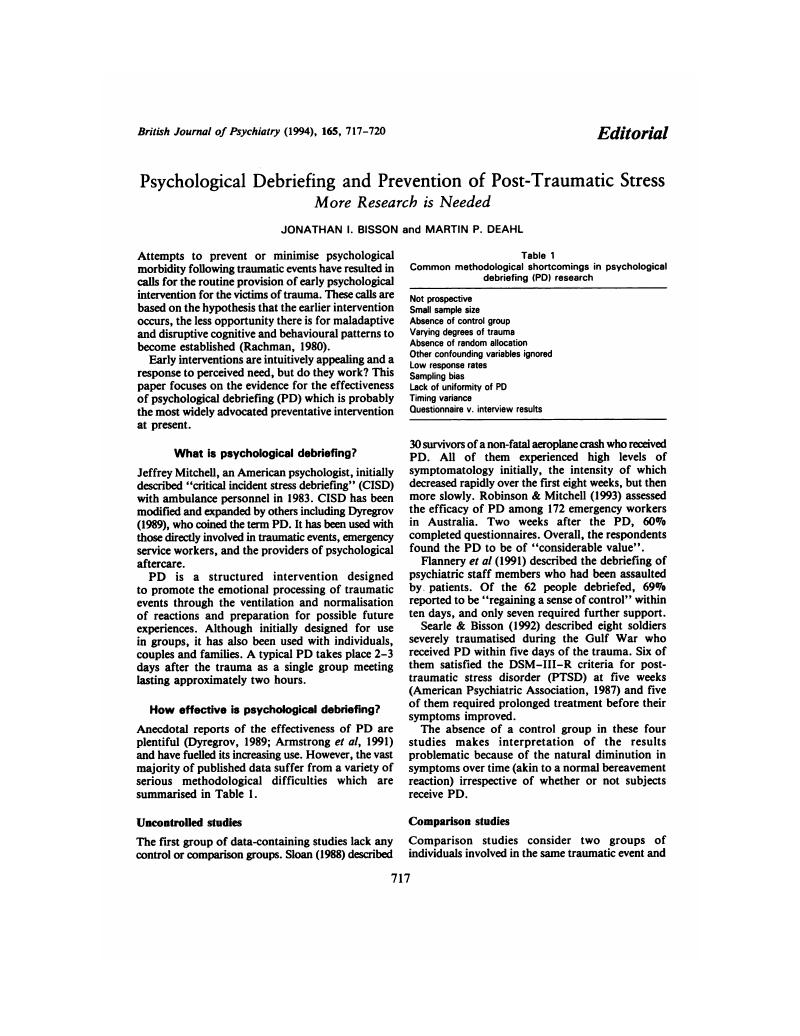Crossref Citations
This article has been cited by the following publications. This list is generated based on data provided by Crossref.
Hobbs, Mike
1995.
A district framework for managing psychosocial aspects of disaster.
Advances in Psychiatric Treatment,
Vol. 1,
Issue. 6,
p.
176.
Parson, Erwin Randolph
1995.
Mass traumatic terror in Oklahoma City and the phases of adaptational coping, part II: Integration of cognitive, behavioral, dynamic, existential and pharmacologic interventions.
Journal of Contemporary Psychotherapy,
Vol. 25,
Issue. 4,
p.
267.
Bisson, Jonathan I.
and
Shepherd, Jonathan P.
1995.
Psychological Reactions of Victims of Violent Crime.
British Journal of Psychiatry,
Vol. 167,
Issue. 6,
p.
718.
Hendriks, Jean Harris
and
Newman, Martin
1995.
Psychological trauma in children and adolescents.
Advances in Psychiatric Treatment,
Vol. 1,
Issue. 6,
p.
170.
Tarnopolsky, A
and
Shammi, C
1995.
Post-Traumatic Stress Disorder: Personal Disability, Social Cost, and Prevention.
The Canadian Journal of Psychiatry,
Vol. 40,
Issue. 8,
p.
496.
Finnegan, Alan P
1995.
Critical incident stress debriefing in clinical practice.
British Journal of Therapy and Rehabilitation,
Vol. 2,
Issue. 12,
p.
679.
Richardson, Gregory J.R.
and
Williams, Richard
1996.
Child and adolescent mental health services.
Current Opinion in Psychiatry,
Vol. 9,
Issue. 4,
p.
262.
Eaton, William W.
and
Harrison, Glynn
1996.
Prevention priorities.
Current Opinion in Psychiatry,
Vol. 9,
Issue. 2,
p.
141.
Mackenzie, M. C.
1996.
Towards the Best Public Health Response to Horrendous Events.
Australasian Psychiatry,
Vol. 4,
Issue. 6,
p.
327.
Fletcher, Keron
1996.
The management of released hostages.
Advances in Psychiatric Treatment,
Vol. 2,
Issue. 6,
p.
232.
Hassard, A.
1996.
Reverse learning and the physiological basis of eye movement desensitization.
Medical Hypotheses,
Vol. 47,
Issue. 4,
p.
277.
Cremniter, Didier
Crocq, Louis
Louville, Patrice
Batista, Guillermo
Grande, Cristopher
Lambert, Yves
and
Chemtob, Claude M.
1997.
Posttraumatic Reactions of Hostages After an Aircraft Hijacking.
The Journal of Nervous & Mental Disease,
Vol. 185,
Issue. 5,
p.
344.
Plant, Barbara
1997.
Psychological debriefing in the work context: efficacy issues and practical considerations.
Clinical Psychology Forum,
Vol. 1,
Issue. 110,
p.
25.
SHALEV, ARIEH Y.
1997.
Treatment Failure in Acute PTSD.
Annals of the New York Academy of Sciences,
Vol. 821,
Issue. 1,
p.
372.
Casswell, Geraldine
1997.
Learning from the Aftermath: The Response of Mental-Health Workers to a School-Bus Crash.
Clinical Child Psychology and Psychiatry,
Vol. 2,
Issue. 4,
p.
517.
McIvor, Ronan J.
Canterbury, Rachel
and
Gunn, John
1997.
Psychological care of staff following traumatic incidents at work.
Psychiatric Bulletin,
Vol. 21,
Issue. 3,
p.
176.
Yehuda, Rachel
Harvey, Philip
and
O’Carroll, Ronan E.
1997.
Recollections of Trauma.
p.
221.
Paton, Douglas
1997.
Post‐event support for disaster workers: integrating recovery resources and the recovery environment.
Disaster Prevention and Management: An International Journal,
Vol. 6,
Issue. 1,
p.
43.
BISSON, JONATHAN I.
1997.
Editorial Is post-traumatic stress disorder preventable?.
Journal of Mental Health,
Vol. 6,
Issue. 2,
p.
109.
Brookes, Jennifer G
1997.
The impact of violence on emergency department staff.
Emergency Medicine,
Vol. 9,
Issue. 2,
p.
117.






eLetters
No eLetters have been published for this article.